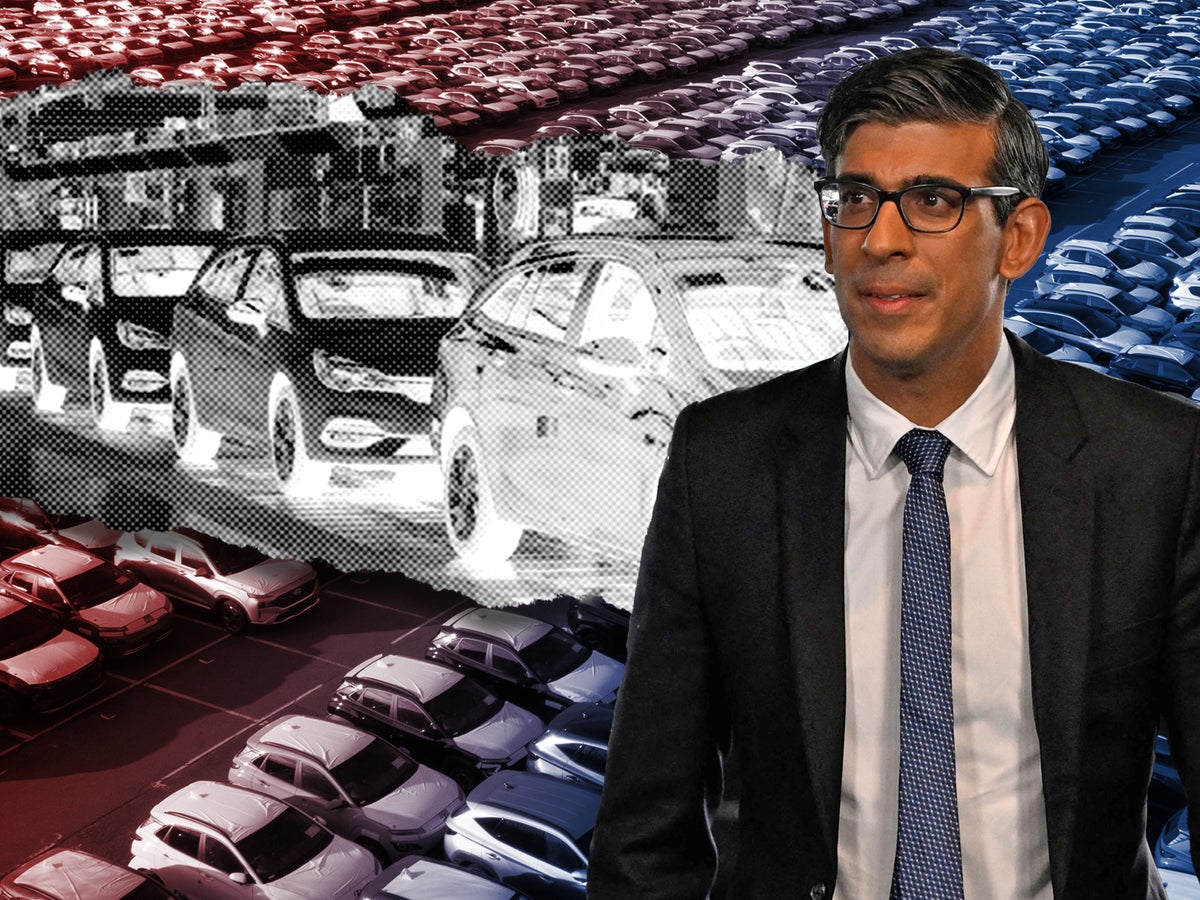
Rishi Sunak’s government is understood to be lobbying the EU to delay a change in manufacturing rules in the Brexit trade deal after the owner of Vauxhall warned it could shut its UK factories.
Vauxhall’s parent company Stellantis said it will be unable to keep a commitment to make electric vehicles in the UK without changes to Boris Johnson’s Trade and Co-operation Agreement (TCA).
Business secretary Kemi Badenoch has raised the issue with her Brussels counterpart, according to the government, and the cabinet minister had a pre-arranged meeting with Stellantis chiefs on Wednesday.
She has also raised the motor industry’s concerns about the TCA with chancellor Jeremy Hunt and foreign secretary James Cleverly, according to Whitehall sources.
The government is lobbying the EU to delay a 2024 deadline for changes in how much an electric car should be manufactured in the UK, Bloomberg first reported.
It comes as Labour leader Sir Keir Starmer said “we need a better Brexit deal” with the EU to ensure firms such as Vauxhall can continue to operate in the UK.
Vauxhall’s owner has called on the government to reach agreement with the EU to maintain existing rules until 2027 – rather than 2024’s planned changes which state 45 per cent of an electric car’s value should originate in the UK or EU to qualify for trade without tariffs.
Without meeting the requirements, cars manufactured in the UK would be hit 10 per cent tariff, making domestic production and exports uncompetitive with cars built elsewhere.
Stellantis – the parent company of Vauxhall, Citroen, Peugeot and Fiat which employs more than 5,000 people in the UK – committed to making electric vehicles at its Ellesmere Port and Luton plants two years ago.
But in a submission to an MPs’ inquiry, the company said the Brexit deal was a “threat to our export business and the sustainability of our UK manufacturing operations”.

Stellantis said the rise in the cost of raw materials meant it was “unable to meet these rules of origin”. Part of the problem is that a battery pack can account for up to half a new EV’s cost, with batteries heavy and expensive to move long distances.
A No 10 spokesman confirmed the Ms Badenoch “has raised this already with the European Commission – it’s been raised at official level as well and we hope to come to a resolution with the EU on this”.
Asked whether the January 2024 deadline could be pushed back, Mr Sunak’s spokesman said: “We’re looking to what solutions we can put in place to a problem that we know exists, I’m not going to get ahead of the conversations we’re having with the EU.”
Downing Street said raw material costs have spiked for car manufacturers for “a number of reasons” after it signed the Brexit deal. “That’s a problem for manufacturers across Europe not just here in the UK,” said the No 10 spokesman.

Rules of origin of electric cars and batteries were among the final parts of the Brexit deal agreed between then-PM Boris Johnson and European Commission Ursula von der Leyen in 2020.
Transport minister Richard Holden suggested earlier on Wednesday that there were “further tweaks” which could be made to the deal with the EU.
Mr Holden told LBC: “I’m sure that there are further tweaks that could be made… if more work needs to be done, I’m absolutely certain that the business and trade secretary will do that over the coming days and weeks.”
Sir Keir went further and vowed to renegotiate the Brexit trade deal, telling BBC Breakfast that although rejoining the EU was not on the table “we do need to improve that deal”.

The Labour leader added: “Of course we want a closer trading relationship, we absolutely do. We want to ensure that Vauxhall and many others not just survive in this country but thrive … So yes we need a better Brexit deal. We will make Brexit work.”
Andy Palmer, former chief operating officer at Nissan, told BBC Radio 4’s Today programme that the entire automobile sector in the UK – including 800,0000 – was at risk.
He that it is was “impossible to meet local content rules unless you source your battery within the UK or EU” but the “supply chain at the moment isn’t there” in Britain. “The cost of failure is very clear. It is 800,000 jobs in the UK, which is those jobs associated with the car industry.”
Car manufacturers said Britain had to attract more battery production to help secure the future of the industry. Chancellor Jeremy Hunt hinted there would soon be a development on battery production. “Watch this space, because we are very focused on making sure that the UK gets EV and manufacturing capacity,” he told an event on Wednesday.
But the head of collapsed battery cell manufacturer Britishvolt blamed the Tory government – and tensions between Mr Johnson and Mr Sunak – for its failure. Orral Nadjari said the UK had “lost that window of opportunity” to develop gigafactories.
Mr Nadjari told Sky News that Britishvolt suffered damaging delays getting grant funding secured because the firm was “caught between a rock and a hard place” as the Treasury clashed with No 10.
Denying his claims, a government spokesperson said: “These claims are completely untrue”. The spokesman said “full due diligence” was undertaken before a grant offer was made and ultimately “conditions were not met”.
Mike Hawes – chief executive of the Society of Motor Manufacturers and Traders – also called for urgent action. The industry chief said the rules of origin for batteries “pose a significant challenge to manufacturers on both sides of the Channel”, before adding: “A pragmatic solution must be found quickly.”
Professor David Bailey, professor of business economics at the Birmingham Business School, warned on BBC Radio 4 that the trade rules issue was an “existential threat to the UK car industry”.







